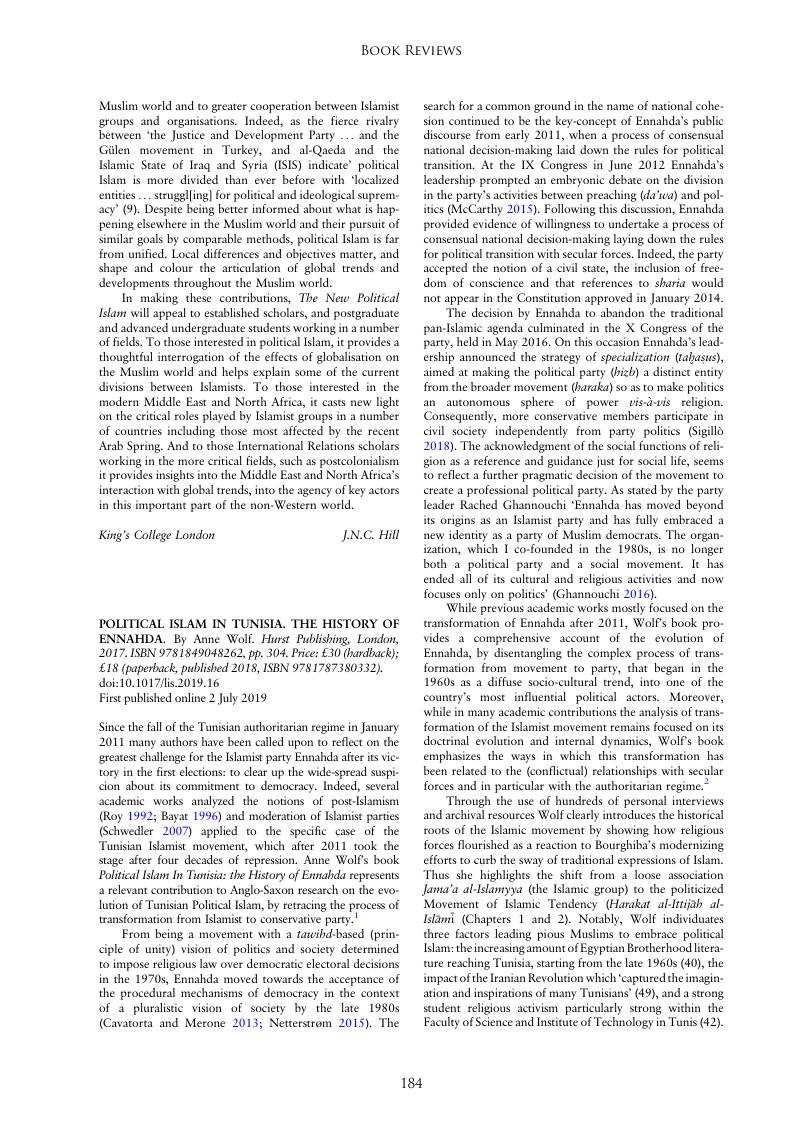No CrossRef data available.
Article contents
Political Islam in Tunisia. The History of Ennahda. By Anne Wolf. Hurst Publishing, London, 2017. ISBN 9781849048262, pp. 304. Price: £30 (hardback); £18 (paperback, published 2018, ISBN 9781787380332).
Published online by Cambridge University Press: 02 July 2019
Abstract
An abstract is not available for this content so a preview has been provided. Please use the Get access link above for information on how to access this content.

- Type
- Part 3: Book Reviews
- Information
- Copyright
- Copyright © The Society for Libyan Studies 2019
References
Bayat, A. 1996. The coming of a post-Islamist Society. Critique: Journal for Critical Studies of the Middle East, 5(9): 43–52.Google Scholar
Cavatorta, F. and Merone, F. 2013. Moderation through exclusion? The journey of the Tunisian Ennahda from fundamentalist to conservative party. Democratization 20(5): 857–875.Google Scholar
Cavatorta, F. and Merone, F. 2015. Post-Islamism, ideological evolution and ‘la tunisianité’ of the Tunisian Islamist party al-Nahda. Journal of Political Ideologies, 20(1): 27–42.Google Scholar
Dell'Aguzzo, L. and Sigillò, E. 2017. Political legitimacy and variations in state-religion relations in Tunisia. The Journal of North African Studies 22.4: 511–535.Google Scholar
Ghannouchi, R. 2016. From Political Islam to Muslim democracy. The Ennahda Party and the Future of Tunisia. Foreign Affairs September/October issue. Available at: https://www.foreignaffairs.com/articles/tunisia/political-islam-muslim-democracy (accessed May 2019).Google Scholar
Marks, M. 2015. Tunisia's Ennahda: Rethinking Islamism in the context of ISIS and the Egyptian coup. Rethinking Political Islam Series August 2015. Brookings Institution, Washington. Available at: https://www.brookings.edu/wp-content/uploads/2016/07/Tunisia_Marks-FINALE-5.pdf (accessed May 2019).Google Scholar
McCarthy, R. 2015. Protecting the sacred: Tunisia's Islamists Movement Ennahda and the challenge of free speech. British Journal of Middle Eastern Studies 42.4: 447–464.10.1080/13530194.2015.1005055Google Scholar
McCarthy, R. 2018. When Islamists Lose: The Politicization of Tunisia's Ennahda Movement. The Middle East Journal, 72(3): 365–384.Google Scholar
McCarthy, R. 2018. Inside Tunisia's Al-Nahda: Between Politics and Preaching. Cambridge University Press, Cambridge.Google Scholar
Merone, F., Sigillò, E. and De Facci, D. 2018. Nahda and Tunisian Islamic activism. In Akbarzadeh, S. and Conduit, D. (eds), New Opposition in the Middle East. Palgrave MacMillan, New York: 177–201.Google Scholar
Netterstrøm, K. L. 2015. After the Arab Spring. The Islamists’ Compromise in Tunisia. Journal of Democracy 26(4): 110–124.Google Scholar
Schwedler, J. 2007. Democratization, inclusion and the moderation of Islamist parties. Development, 50(1): 56–61.Google Scholar
Sigillò, E. 2018. Mobilizing for or through development? Trajectories of civic activism in post-authoritarian Tunisia, PhD thesis, Institute of Social and Political Science, Scuola Normale Superiore.Google Scholar
Sigillò, E. 2019. Specializing in ‘civil society'. The evolution of Islamic charitable associations in post-authoritarian Tunisia. AUC Press (forthcoming).Google Scholar




